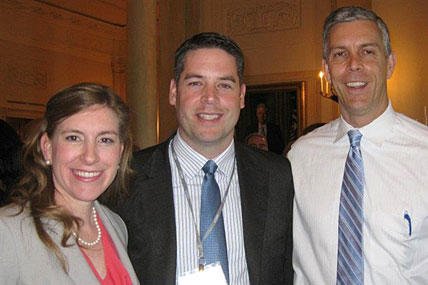WASHINGTON -- Education was front and center in Washington last week and at least two major events directly impact the education of military families’ school-age children.
First, Angela Wilson a 7th grade language arts teacher at a Defense Department school in Vicenza, Italy, spent the week in the nation’s capital representing DoD schools as one of four finalists in the annual National Teacher of the Year competition.
Wilson, accompanied by her husband, Chase, who also is a 7th grade teacher at Vicenza Middle School, shined a light on Department of Defense Education Activity schools for both their quality and also on the unique challenges of their students and teachers.
The week’s packed agenda included a ceremony with President Barack Obama at the White House, a reception at the vice president’s home at the U.S. Naval Observatory with Dr. Jill Biden -- a teacher so dedicated she continues to teach three days each week while serving as “second lady” – as well as opportunities to discuss education policy with Education Secretary Arne Duncan.
The teachers also participated in classes and training of their choice at the Smithsonian, and events with education-focused companies and nonprofits to advance classroom teaching. That, not to mention the discussion these best and brightest had amongst themselves and will no doubt share with their colleagues, should comfort DODEA families.
The knowledge and skills the Wilsons will bring back to the classroom is vast. But even more important, Angela Wilson told American Forces Press Service, will be her message to students that American leaders -- all the way to the president -- care about them and their education.
“They do value education, you can tell,” she said.
The news got even better when Duncan sent an April 24 letter to all public school superintendents -- where 80 percent, or 1.2 million, of students from military families are enrolled -- encouraging them to understand and respond to the needs of military students, many of whom change school districts more than a half dozen times in their parents’ military careers.
Duncan asked the superintendents, among other things, to raise awareness of issues related to military children, especially those with disabilities; adhere to the Military Interstate Children’s Compacts, which 42 states have signed to make it easier for military children to transfer credits between states; and review policies, including in extracurricular activities, that may impede military children’s transitions.
“We want all military-connected school children to have an equal and fair opportunity for academic success,” Duncan wrote. “This requires that those individuals who make up our nation’s educational system -- our teachers, principals, school nurses, coaches and counselors-- understand the unique situations the children of our service members experience.”
Just like the DODEA students who receive Mrs. Wilson’s message, all military children should understand that their school, their community, their nation has their back.





















